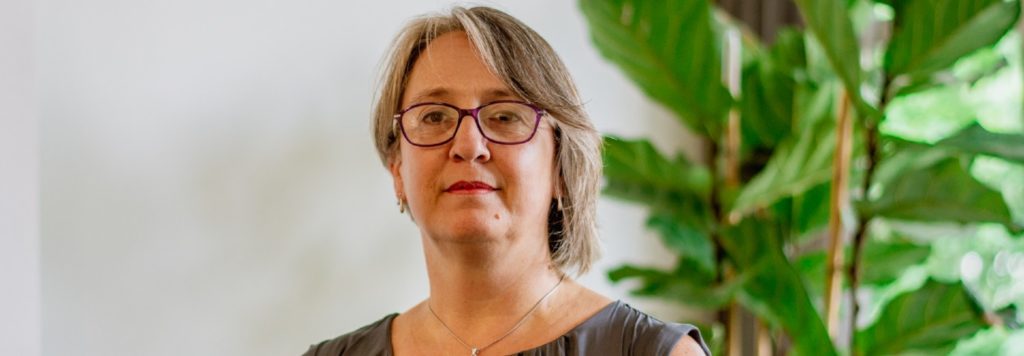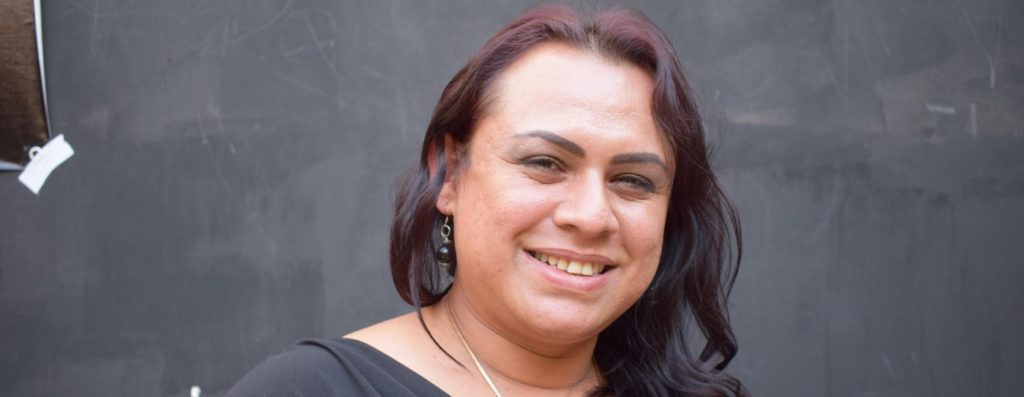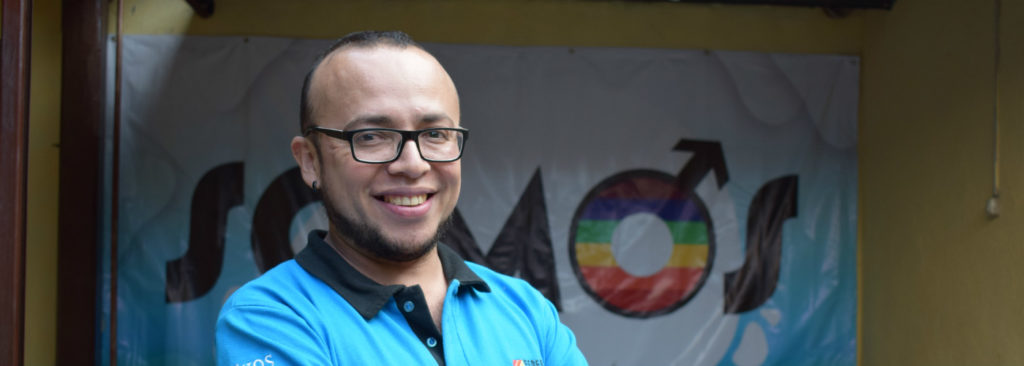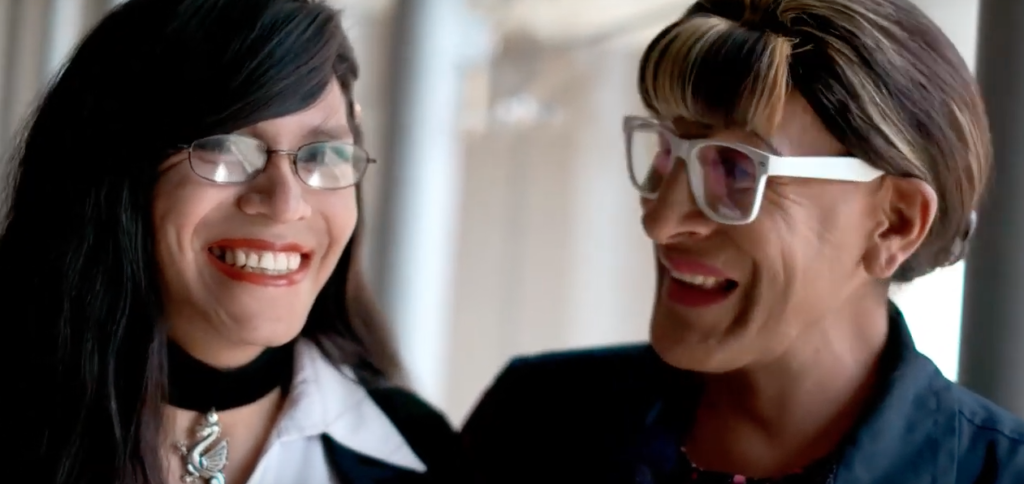At the end of 2019, we had the chance to witness the work of Right Here Right Now (RHRN) platforms in Honduras and the Caribbean. This is the first in a series of stories about brave people and grassroots organizations and their struggles advocating for human rights.
We could start this story by describing Nicole’s afro. It’s really colorful – something you don’t see every day. But that wouldn’t be right, and you will find out why later.
We meet at the RHRN office in Tegucigalpa, the capital city of Honduras. Nicole is hustling and bustling non-stop. She answers a call, rushes to another floor, returns, answers a question, starts organizing a stack of files, ends the first call – then takes another one.
Finally, she introduces herself.
Nicole, a women’s rights activist, says she’s been working as an administrator at RHRN for just a month. That’s hard to believe after the multi-tasking we’ve just witnessed. However, her sweater confirms that she’s not from the capital. “I wear a sweater because I feel cold. I come from a place that’s really hot,” she explains, laughing.
She means La Ceiba, a city on the Atlantic coast 400 kilometers from Tegucigalpa. It was named by its first inhabitants, the Garifuna people. They are the descendants of a mix of African slaves and the local indigenous population. Slaves who escaped from nearby San Vicente Island found shelter under the majestic Ceiba (Kapok) trees that populated their new home, hence its name.
As the daughter of a black woman and an indigenous man, Nicole embodies the Garifuna. She is the living representation of intersectionality, when struggles of different groups are experienced by the same person. In the words of singer Maimouna Youssef, “Being a woman is like being black twice.”
But Nicole’s destiny differed from that of her ancestors. A month ago she left La Ceiba and moved to Tegucigalpa. She had to say goodbye to the sea, to the heat and to something very important: “I’ve lived all my life with my family, we’ve never been apart.”
The family
Nicole’s mother Lusy was pivotal in her becoming a women’s rights activist. Lusy, a nurse and an activist, encouraged her daughter to get involved in activism both out of conviction and necessity. Youth unemployment represents 60% of the jobless population in the country. This is even worse for someone like Nicole because seven out of ten young unemployed people are women.
We don’t have to be the same to fight the good fight.
That’s how Nicole became a trainee and eventually a spokeswoman of the Black Women of Honduras Association (Enlace de Mujeres Negras de Honduras, ENMUNEH). This is a feminist organization that fights to eradicate gender violence and protect the sexual and reproductive rights of black and indigenous women.
ENMUNEH also represents indigenous women not linked to the Garifuna. As Ely Menéndez, a black woman economist working with ENMUNEH, puts it, “We don’t have to be the same to fight the good fight.”
Just as Lusy taught her daughter to appreciate her Garifuna culture and fight for human rights, Nicole shares what she’s learned with her younger sisters and brother.
Nicole now encourages her siblings and many other young people across Honduras from her position at RHRN. Using the capacity and leadership building tools that RHRN provides, she helps them fight all the challenges they have to face.
Nicole also takes as many training courses as she can. “I am always involved in both aspects of the RHRN platform – my day job and training. This is a real school for me. I’ve seen how much I have developed, how I’ve progressed and learned. And the staff who coach us are my family.”
Joanne Nicole
As we talk, Nicole reveals the driving force in her life: Joanne Nicole, her seven-year-old daughter living back in La Ceiba with Lusy.
We have to be aware of what our rights are.
That makes those 400 kilometers feel like a universe sometimes, but Nicole says it’s worth it. As a mother, she knows how important RHRN will be for daughter later on. “We have to be aware of what our rights are. Having learned that helps me to teach her.”
We were interested to learn that Nicole, who manages a platform for sexual and reproductive rights and LGTB+ rights, is also the granddaughter of an evangelical minister. She emphasizes that not all families practice the gospel from love like hers does. “We live in such a fundamentalist world, in a society with so many double standards.”
But she’s not afraid to leave the safety of her office and face Honduran society to speak about the most controversial topics. Like sexual violence against minors, or the emergency contraceptive pill in the only country in the region that prohibited its sale and use 10 years ago.
This motivated her to act as a spokesperson for RHRN in the manifiestopae.org campaign. There, besides informing people about the pill, she calls out the state for ignoring the more than 150 rape cases against minors that are reported every month. She doesn’t want Joanne or any other little girl to become one of those statistics nor part of the almost quarter of a million girls and young under 18 that have been forced to give birth since the ban.
Prejudice
In addition to fundamentalism and patriarchy – which put those young pregnant women at high risk and kill more than a woman a day just for being a woman – Nicole mentions another force she fights against daily: racism.
“In Honduras they want to cover it up, but racism does exist.” It is so obvious and ubiquitous that she even saw a journalist on TV refer to three congresswomen – two of them Garifuna – as “blackies” (“negritas”). And heard afro-descendant players being called “monkeys” by fans in a soccer stadium.
These examples are taken from public life. But, Nicole also experiences racism in her daily life, where there is no media coverage. She recalls people thinking that because she’s Garifuna she’s only good for dancing punta, cooking casabe or selling coconut bread at the beach. Or how at every job interview, “They always downplay me because of my hair. As if my abilities depend on the type of hair I have. This stereotyping of black women, even though it’s part of our culture, is also stigmatization. It assumes we’re only good at certain things because of our race.”
And that is exactly why at the beginning of this story we didn’t go on to describe her hair.
Nicole isn’t just an afro. She is a woman, she is black, she is indigenous, she is Garifuna. A manager, an activist, a mother, a daughter, a sister – and much more. And we also know she is ready to defend her entire family and the entire community from the prejudice that has haunted them for centuries.
About Right Here Right Now
Right Here Right Now (RHRN) is a five-year program implemented by Hivos in Latin America and the Caribbean, in alliance with Rutgers. The program advocates for access to sexual health and reproductive rights of women, young people and the LGBT+ population. Its main focus is the social inclusion of sexually diverse populations and minorities.










